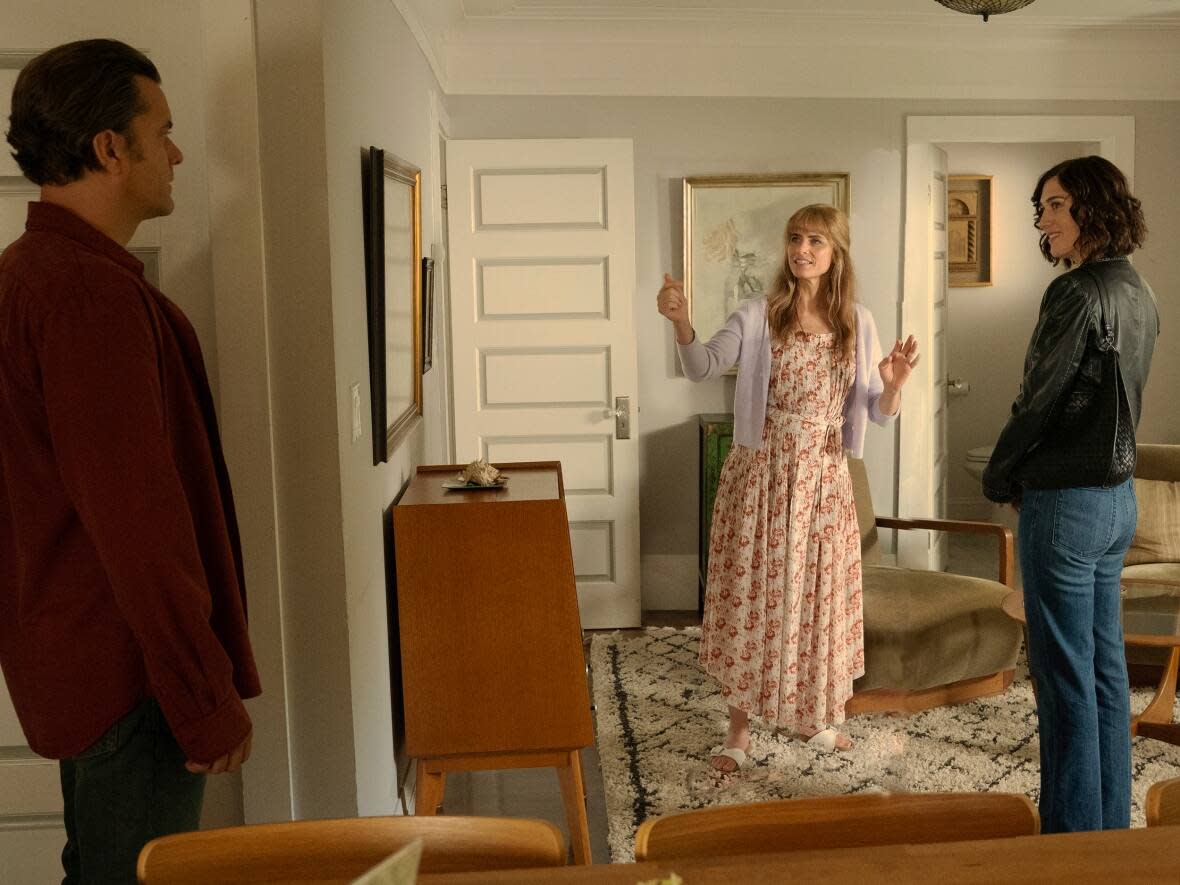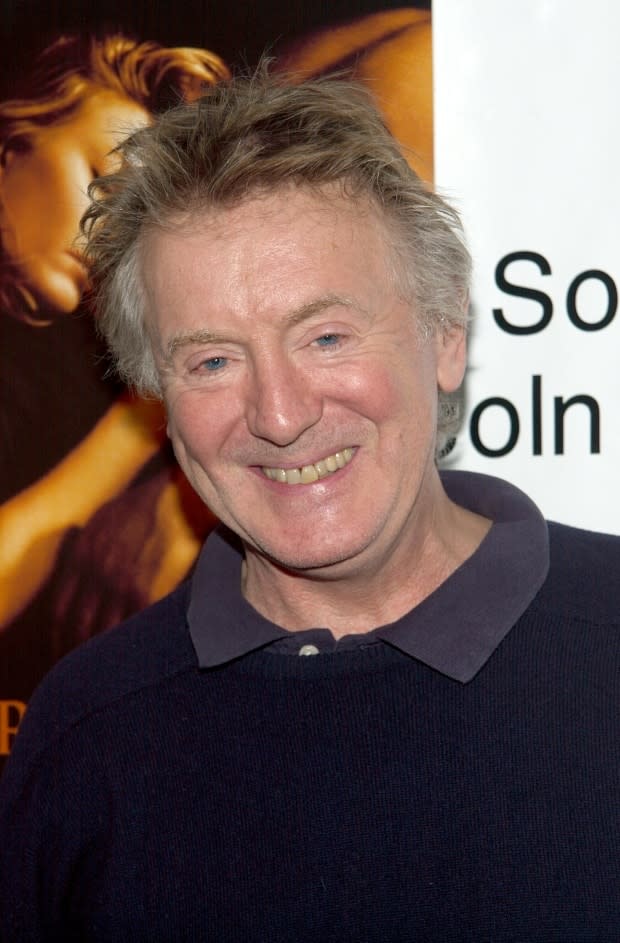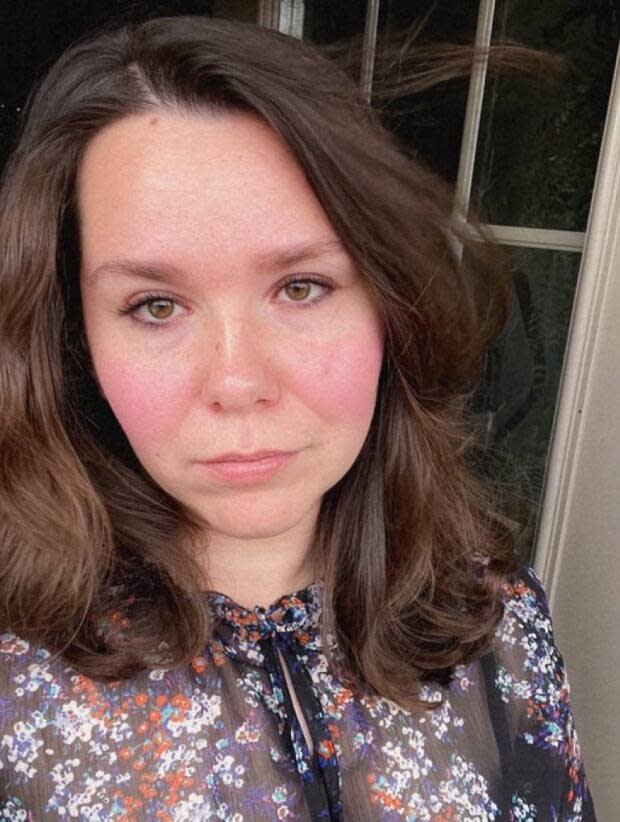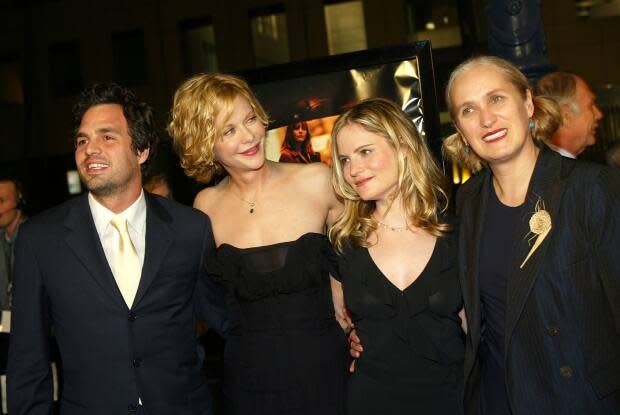How Fatal Attraction and the erotic thriller seduced a new generation of fans

Amanda Peet knew making an erotic thriller in 2023 would be complicated when she accepted a role in the television adaptation of Fatal Attraction.
The limited series reimagines the steamy-scary 1987 hit, in which a married man and his family are tormented by a troubled woman after a one-night stand. But this depiction conveys more empathy for its femme fatale Alex and harsher consequences for its male protagonist, Dan. Peet plays Dan's wife, Beth.
This modern take tries to "subtly upend the Madonna-whore trope that's in the original movie, where there's this lovely housewife, homemaker, and then this sex-crazed psycho bunny boiler," Peet said in an interview with CBC News.
A mainstay of 1980s and '90s cinema, the erotic thriller wave spawned movies such as Body Heat, Indecent Proposal, Disclosure, Basic Instinct, Showgirls and Dressed To Kill — typically nail-biters with an illicit or romantic affair at their centre. But our conception of sexual politics and power dynamics have shifted drastically since those days.
"We know that women have nuanced personalities and have different qualities and facets of their personalities that are interesting," Peet said. "They can still be maternal and sexual at the same time."
The genre is having a moment, years after a number of factors led to its decline in the early 2000s — a push for more general audience projects and the rise of online pornography among them. Recent movies like Deep Water and Don't Worry Darling explored their conventions; and on television, several films from the period are being readapted for the small screen, as with Fatal Attraction.
There have also been efforts to bring classic titles back to nostalgic audiences in the form of repertory screenings and curated film programming, as a larger and more diverse generation of critics re-examine films that, while harshly reviewed at the time of their release, are seen in a different light in the post-#MeToo world.
TV adaptations of classic erotic thrillers an emerging trend
Last February, one Toronto cinema offered some alluring counter-programming on Valentine's Day. Instead of watching Meg Ryan in You've Got Mail, why not watch her in the 2003 Jane Campion film In The Cut, about a woman who begins a sexual relationship with a suspicious detective investigating a murder in her neighbourhood?
"I absolutely do think that there's a resurgence, and kind of an interest in making these types of films again," said Robyn Citizen, a lead programmer at the Toronto International Film Festival who co-curated the screening as part of the erotic thriller series at the TIFF Bell Lightbox.

The Lightbox's lineup went heavy on the nostalgia, but there have been several recent additions to the canon. Montreal-set erotic thriller The Voyeurs, released in 2021, starred Sydney Sweeney as a woman who begins a voyeuristic relationship with her neighbours across the street; while the upcoming film Sanctuary starring Margaret Qualley, which premiered at the Toronto festival in 2022, focuses on the toxic relationship between a dominatrix and her submissive partner.
"I think it has to be a little bit different because gender politics are different, our politics and our social life looks different," said Citizen. She and her colleagues were inspired to program the series after reading a viral article called Everyone is Beautiful and No One is Horny, which was published by the digital magazine Blood Knife in 2021.
"If you think about the films from the 1980s and the people that starred in erotic thrillers, they all very much met this standard of — and it has to be said, not diverse — conventional attractiveness. But they didn't look like the platonic ideals of feminine and masculine beauty as they do now," said Citizen.
Justine Smith, a Montreal film critic and screen editor at CultMTL, an arts and culture publication, said that the renewed interest in erotic thrillers, while there, is manifesting more frequently on television than it is in film.
"Part of it is the popularity of not just superhero films, but a lot of franchise and general audience and family movies where a lot of the studios really focus their energy on producing products and putting their time, their resources and their money into making something that appeals to the most general audience possible across the world," she said.
"If you're going to look for quote-unquote adult stories or stories that have to do with sex or illicit affairs, you're actually going to find that on TV, cable television mostly."
WATCH | 'I'm not going to be ignored, Dan!' A famous scene from 1987's Fatal Attraction:
The new Fatal Attraction comes off the heels of last year's TV adaptation of American Gigolo, Paul Schrader's 1980 film about a male prostitute accused of murder. Similarly, an adaptation of David Cronenberg's Dead Ringers, about a pair of identical twin gynecologists who take advantage of their patients, was just revived with Rachel Weisz playing the lead roles. Netflix's recent erotic thriller Obsession is a remake of the film Damage, starring Jeremy Irons.
"A television series, even a miniseries, is at least six hours. So you have kind of time to develop all of these different relationship factors that can kind of create a sex scene, for example, or a dangerously erotic scene that feels very earned," said Smith.
A critical reappraisal

Adrian Lyne, the British filmmaker who directed a string of what he prefers to call romantic dramas in the 1980s and '90s, including Fatal Attraction, Indecent Proposal and 9½ Weeks, returned to filmmaking with 2022's Deep Water, starring Ben Affleck and Ana de Armas.
Unlike the TV adaptation of his most famous film — which Lyne is curious to see but didn't have involvement in — the Oscar-nominated filmmaker said he didn't make any conscious attempt to update Deep Water's sexual and relationship politics for a new generation.
"I think if you start worrying about that, that's very dangerous, that kind of pre-censorship ... so that didn't change," he said. Lyne used an intimacy co-ordinator on set to act as a mediator between the actors and the production during the filming of sex scenes, an increasingly common practice.

Still, he rejects the term "erotic thriller," which he feels is used to equate eroticism with sleaze or smut. Those words "endlessly come up together when [critics are] talking about erotic movies as if eroticism is inherently wrong," he told CBC News.
"And that frustrates the sh-t out of me, really. Because obviously sex is part of any relationship. And I don't think you should cut it out. And you shouldn't make too much of it. You shouldn't beat it to death."
As the critic Smith points out, the critical landscape has changed dramatically since Fatal Attraction was released. There are more women and more racialized people offering a different lens on films that, at the time of their release, were not well-received among critics — which, at the peak of the erotic thriller, was a more exclusive, insular group.
In The Cut, for example, has received renewed critical attention after reviews at the time of its release frequently targeted Meg Ryan, who up to that point was mostly known as a romantic comedy heroine.
"It goes beyond just not liking the film," said Smith. "It's being ruthless about what the critics, who at the time were primarily men, just didn't find attractive. Because they didn't find her attractive. They determined the movie could not be sexy. They determined the movie could not be erotic, which is a very limited point. It's not just limited, it's like a misogynistic perspective."

"I think there are some criticisms of a lot of erotic thrillers or the treatment of women in film that need to be addressed," said Smith. But there's also a need to address how on-screen sex is approached in a way that doesn't put anyone in danger, she added.
For better or for worse, the 2023 version of Fatal Attraction does away with the "bunny boiler" archetype, instead focusing on its female lead's psychological motivations.
"Fatal Attraction was a brilliant movie at the time and still is," said Peet.
"I think audiences are more interested in seeing things from a female perspective or from a perspective that serves both.
"We're not just in the male gaze anymore."


